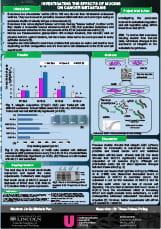by Jin Ke Michele Pan

Cancer is often imagined as a monstrous disease that spreads and metastasises in healthy tissue, destroys biological processes and wrecks havoc in the organism that is affected. But recent discoveries have shown that the process of metastasis is highly regulated and there is a lot of “preparation” happening on a molecular level.
It is known that cells communicate with each other and they do so thanks to a plethora of mechanism. Recently extracellular vesicles (EVs) coming from tumour cells have been observed to be involved in promoting the development of cancer metastasis. During the summer we looked at cell membrane proteins known as Mucins and what would be the effects if they started to be carried to specific tissues by exosomes. We were particularly interested in looking at how these cell membranes glycoproteins would affect expression of Integrins in the recipient tissues. Our ultimate aim was to uncover the biomolecular pathways that tumours were using to transport mucins throughout the body, targeted healthy components of the ECM (extracellular matrix) and prepared the microenvironment on the secondary site for metastasis to occur.
To do so we prepared exosomes containing Mucins and we treated Hs68 cells (which act as model of ECM cells), and measured changes in expression of integrins using qPCR. Our results showed that exosomes containing MUC12 increased the expression of INTα5 but decreased levels of INTαV. Moreover different cell lines resulted in different levels of integrin expression (data not shown on the poster).
I could not be more satisfied and grateful for the opportunity given to me by taking part to this UROS funded project. I had the chance to work in a profession research environment and was guided by my infinitively patient supervisor. I had the chance to practise lab techniques that I was familiar to, but most important became more confident in performing protocols that were unfamiliar to me. I had the chance to become more independent in the labs and this will surely help me through my third year dissertation project. Plus I had the chance to attend lab meeting with other researchers which shared their very informative piece of research with me.
Not everything has always worked out perfectly, experiments proved more challenging than anticipated, our prediction were often not as expected, time needed for data collection and available time frequently conflicted, but all of these experiences have helped develop transferable skills that I am sure will make me a better researcher.
In conclusion this project has been a turning point in my sprouting academic career as it has proven me that the research path is the one that I want to pursue.
*To view Jin’s project poster, please click on the thumbnail below:

